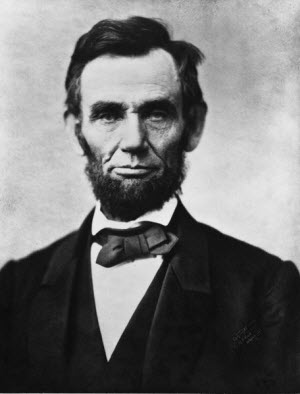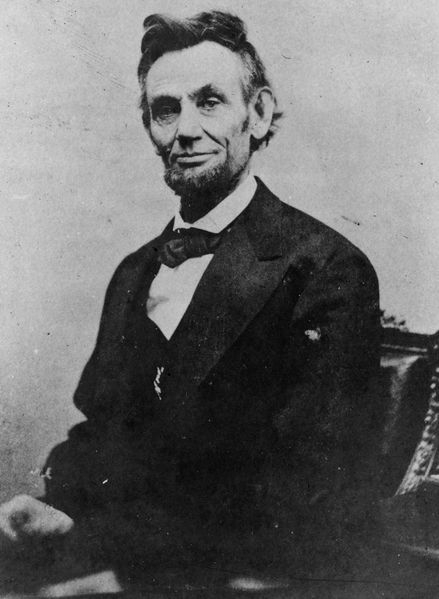Abraham Lincoln was married on November 4, 1842, to Miss Mary Todd, four sons being the issue of the union.
Robert Todd, born August 1, 1843, removed to Chicago after his father's death, practiced law, and became wealthy; in 1881 he was appointed Secretary of War by President Garfield, and served through President Arthur's term; was made Minister to England in 1889, and served four years; became counsel for the Pullman Palace Car Company, and succeeded to the presidency of that corporation upon the death of George M. Pullman.
Edward Baker, born March 10, 1846, died in infancy.
William Wallace, born December 21, 1850, died in the White House in February, 1862.
Thomas (known as "Tad"), born April 4, 1853, died in 1871.
Mrs. Lincoln died in her sixty-fourth year at the home of her sister, Mrs. Ninian W. Edwards, at Springfield, Illinois, in 1882. She was the daughter of Robert S. Todd, of Kentucky. Her great-uncle, John Todd, and her grandfather, Levi Todd, accompanied General George Rogers Clark to Illinois, and were present at the capture of Kaskaskia and Vincennes. In December, 1778, John Todd was appointed by Patrick Henry, Governor of Virginia, to be lieutenant of the County of Illinois, then a part of Virginia. Colonel John Todd was one of the original proprietors of the town of Lexington, Kentucky. While encamped on the site of the present city, he heard of the opening battle of the Revolution, and named his infant settlement in its honor.
Mrs. Lincoln was a proud, ambitious woman, well-educated, speaking French fluently, and familiar with the ways of the best society in Lexington, Kentucky, where she was born December 13, 1818. She was a pupil of Madame Mantelli, whose celebrated seminary in Lexington was directly opposite the residence of Henry Clay. The conversation at the seminary was carried on entirely in French.
She visited Springfield, Illinois, in 1837, remained three months and then returned to her native State. In 1839 she made Springfield her permanent home. She lived with her eldest sister, Elizabeth, wife of Ninian W. Edwards, Lincoln's colleague in the Legislature, and it was not strange she and Lincoln should meet. Stephen A. Douglas was also a friend of the Edwards family, and a suitor for her hand, but she rejected him to accept the future President. She was one of the belles of the town.
She is thus described at the time she made her home in Springfield--1839:
"She was of the average height, weighing about a hundred and thirty pounds. She was rather compactly built, had a well rounded face, rich dark-brown hair, and bluish-gray eyes. In her bearing she was proud, but handsome and vivacious; she was a good conversationalist, using with equal fluency the French and English languages.
"When she used a pen, its point was sure to be sharp, and she wrote with wit and ability. She not only had a quick intellect but an intuitive judgment of men and their motives. Ordinarily she was affable and even charming in her manners; but when offended or antagonized she could be very bitter and sarcastic.
"In her figure and physical proportions, in education, bearing, temperament, history--in everything she was the exact reverse of Lincoln."
That Mrs. Lincoln was very proud of her husband there is no doubt; and it is probable that she married him largely from motives of ambition. She knew Lincoln better than he knew himself; she instinctively felt that he would occupy a proud position some day, and it is a matter of record that she told Ward Lamon, her husband's law partner, that "Mr. Lincoln will yet be President of the United States."
Mrs. Lincoln was decidedly pro-slavery in her views, but this never disturbed Lincoln. In various ways they were unlike. Her fearless, witty, and austere nature had nothing in common with the calm, imperturbable, and simple ways of her thoughtful and absent-minded husband. She was bright and sparkling in conversation, and fit to grace any drawing-room. She well knew that to marry Lincoln meant not a life of luxury and ease, for Lincoln was not a man to accumulate wealth; but in him she saw position in society, prominence in the world, and the grandest social distinction. By that means her ambition was certainly satisfied, for nineteen years after her marriage she was "the first lady of the land," and the mistress of the White House.
After his marriage, by dint of untiring efforts and the recognition of influential friends, the couple managed through rare frugality to move along.
In Lincoln's struggles, both in the law and for political advancement, his wife shared his sacrifices. She was a plucky little woman, and in fact endowed with a more restless ambition than he. She was gifted with a rare insight into the motives that actuate mankind, and there is no doubt that much of Lincoln's success was in a measure attributable to her acuteness and the stimulus of her influence.
His election to Congress within four years after their marriage afforded her extreme gratification. She loved power and prominence, and was inordinately proud of her tall and ungainly husband. She saw in him bright prospects ahead, and his every move was watched by her with the closest interest. If to other persons he seemed homely, to her he was the embodiment of noble manhood, and each succeeding day impressed upon her the wisdom of her choice of Lincoln over Douglas--if in reality she ever seriously accepted the latter's attentions.
"Mr. Lincoln may not be as handsome a figure," she said one day in Lincoln's law office during her husband's absence, when the conversation turned on Douglas, "but the people are perhaps not aware that his heart is as large as his arms are long."
Abraham Lincoln | Events | People | Abraham Lincoln Quotes |
Quotations About Abraham Lincoln | Abraham Lincoln Photo Gallery | Abraham Lincoln Timeline |
Privacy Policy | About Us | Site News | Site Map |
Anecdotes and Stories About Abraham Lincoln


